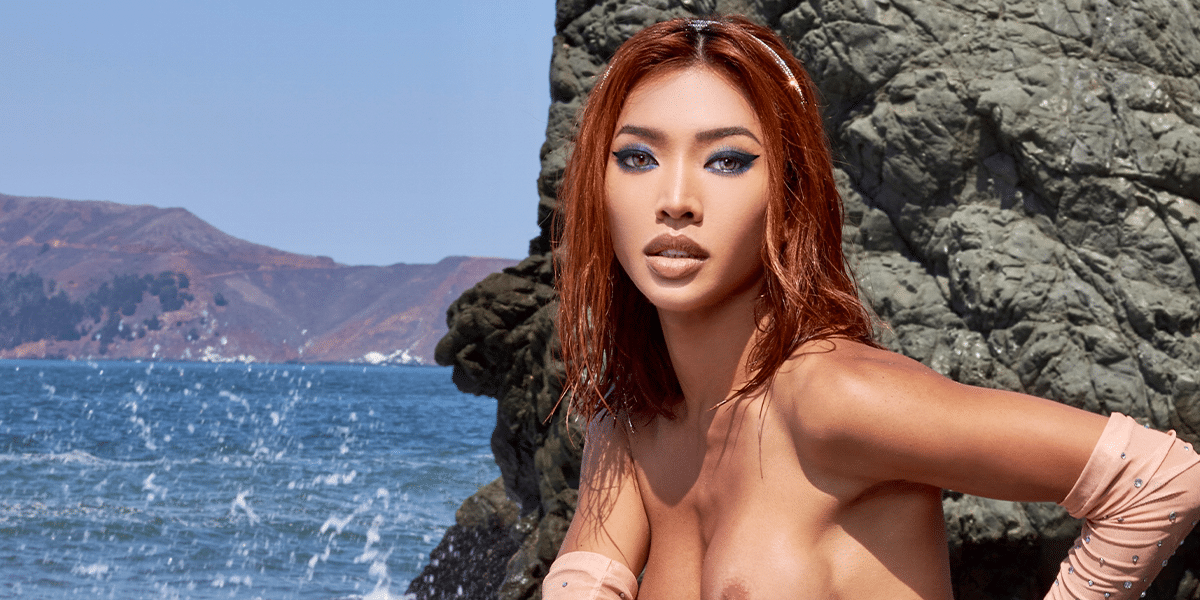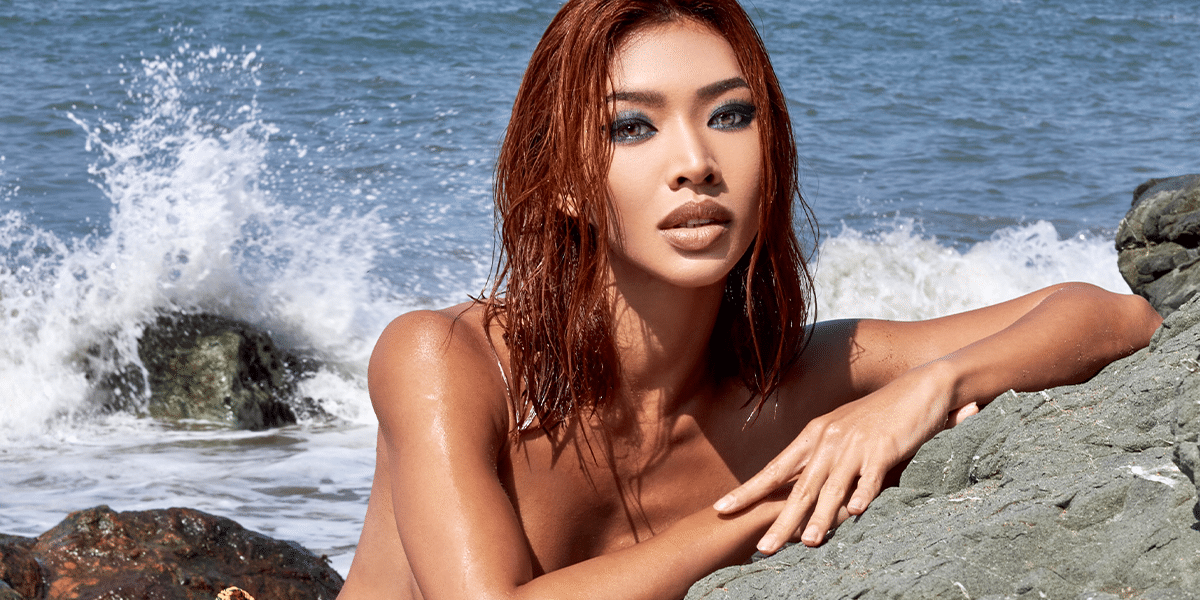Red Gaviola is Bee-autifully Alive
By Bailey Latronica
Professional psychedelic trip sitter and bee-loving environmental activist Red Gaviola practically has her own gravitational pull. She’s an extraordinarily deep thinker, effortlessly sexy, and radiates positivity from the core. She’s even taken her life’s purpose and transformed it into her career. Whether Red is contemplating the universe or speaking passionately about the earth, you’re bound to fall into her orbit and learn something you won’t forget.
“My life philosophy is to always question everything.” Red mentioned at the start of our interview. This philosophy has inspired her since childhood. At just 15 years old Red left the Philippine island she grew up on to move to Manila. Even though the island was “a definition of paradise,” Red was driven to know more about life.
In the big city, Red put herself through school by working as a hairdresser. After graduating at 18 she moved to Switzerland where she worked part-time as a model and studied French. Still motivated to learn more about life, Red then spent the next part of her life traveling the world. Today she’s visited 46 countries and speaks 7 languages.
During her travels, Red fell in love with the earth and, through the use of psychedelic magic mushrooms, realized her purpose is to help heal the planet.
“I love mother earth,” said Red with an earnest passion. “When you see how beautiful the world is, traveling all over the world… everyone must experience the beauty of mother nature.”
But most of us are caught up in every day and disconnected from nature, which actually makes us disconnected from ourselves. Red recognized this disparity and found a way to help both the earth and its human inhabitants.
As a professional psychedelic trip sitter Red helps people connect with their life’s purpose and the earth. She knows just what to do to make sure her clients experience a good, potentially life-changing trip. “[My clients] would tell me that’s the most beautiful experience they’ve ever had in their entire life. Better than sex!” laughed Red. “It’s a life-changing experience for them because they realize the things they really want to do with their life.”

Red’s clients emerge from their psychedelic trips transformed and with a refreshed passion for life. They gain knowledge about their life’s purpose, which makes their lives exponentially better than before they tripped with Red. Many of her clients also develop a newfound connection with nature. “[My clients] are more connected to nature afterward,” said Red with sincere happiness “and when they realize they’re connected to nature, they realize they have to do something to prevent, or at least slowdown, the destruction of our planet.”
While saving the planet seems like a huge and impossible task, there are a lot of little things we can do to help the earth. Giving attention to the buzzing bees we often take for granted is a great start.
Red is an environmental activist who loves bees. Her fascination with earth’s pollinators began in 2019 after she read an article about colony collapse disorder. Still naturally inspired to question everything and learn about life, Red started researching bees on her own. After learning as much as could, she then met and trained with professional beekeepers in San Francisco.
But even as a trained beekeeper Red still wanted to learn more about how to save the bees.
“When I want to know something, I’d rather just go to the site… I went to 9 different countries looking for bees… It’s so difficult to find bees these days! But in the Longoria part of Italy, I met with beekeepers and talked about how to save the population. In general, it comes down to food consumption. Humans waste so much food and that affects climate change, so the bees are losing their natural habitat.
And pesticides. The number one poison for our bees is neonicotinoids.”
Neonicotinoids (called neonics for short) are a type of pesticide that harm the central nervous systems of some insects, such as bees. When exposed to the neonicotinoid residue on pollen, bees become paralyzed and die (Beyond Pesticides). Neonics are a deadly contributor to the decline of the bee population.

“If there were no bees,” said Red, “there would be a collapse in our ecosystem.” And this sort of collapse would be immediate and severe. Animals that eat plants pollinated by bees would begin to go extinct and grocery stores could supply only half the fruits and vegetables available now. Simply put, there wouldn’t be enough food for the 7 billion people on earth (BBC Earth Unplugged, 2014).
“When I see fruits and vegetables in the grocery shop I don’t just see it as food,” said Red. “I see it with a background… It’s not just planted by our farmers and then grows immediately! Without the help of our pollinators, it wouldn’t be possible to get fruits and vegetables.”
Bees are important! They’re a crucial part of our world and quite literally contribute to life as we know it. Fortunately, there’s still time to save the bees and help our planet.
According to Red, there are 6 ways everyday people can help save the bees.
“We can save the bees by:
- planting native trees and flowers that are rich in pollen and nectar,
- saying no to synthetic pesticides, fertilizers, herbicides, and neonicotinoids,
- building homes for solitary and wild bees,
- supporting local beekeepers and organizations,
- buying food from small-scale local farmers, and
- intermittent fasting.”
You don’t have to be an environmental activist to help save the bees. If you want to take the first step but don’t know where to start, Red recommends you try intermittent fasting.

“Fasting is good for our health and good for the planet… Less food means less food transportation and less release of carbon dioxide in the atmosphere… I’ve perfected intermittent fasting! I only eat once or twice a day. The last time I ate a meal was about 24 hours ago.”
Along with fasting, Red also shops locally and prefers produce grown within a 50-mile radius of her home. Structuring her lifestyle around saving the planet is massively important to her, but it isn’t the only way she prioritizes environmental activism.
Red is active on social media to spread awareness about saving the bees. Her Instagram feed is full of valuable information and grows daily. “I like to make mini videos and images so I can release them to the public and spread awareness about bees…I wasn’t a social media person before, but I realized that’s the best way to reach people. So I keep on posting about the benefits of magic mushrooms, fasting, and the importance of our bees.”
When asked why she’s so passionate and action-oriented Red took a few moments to really consider her answer. She didn’t start talking about the climate crisis. She didn’t mention neonicotinoids. Instead, she simply responded, “Because it’s the right thing to do.”
Red is a deep thinker with a strong moral code. When she’s not helping people realize their life’s purpose or saving the bees, Red likes to spend time speculating the universe.
“Everything is connected,” spoke Red with a touch of magic in her voice. “Before I go to bed I always watch something about the universe, how it was formed, the things going on outside the earth… When I look at the universe that way I feel so insignificant. I feel so small that my feelings and thoughts don’t really matter at all, but it actually does! Everything is connected. Even this interview will affect the quality of my life. Because your actions now will affect everything… I love that.”

As philosophical and out-of-this-world as that may sound, Red is completely right. From the sparkling stars to the buzzing bees, everything in our universe is connected. If Red hadn’t left the island she never would have traveled the world. If she hadn’t traveled the world she may have never fallen in love with it. And if she hadn’t merged her life’s purpose with her career, you wouldn’t be reading this article right now!
Red is bee-autifuly alive. She’s living proof that it’s possible to live in alignment with your life’s purpose and be a source of change in our world. Because no matter who you are, your actions are important. You have the ability to help save the bees and our planet. You’re an important part of earth’s ecosystem (of the whole universe, really!) and everything you do is connected to something else.
In the future Red plans to move back to the Philippines. She’s still intrinsically motivated to learn about life and question everything, so she wants to explore parts of the country she hasn’t visited yet, as well as spend quality time with her family. She also dreams of one-day planting and eating food from her own garden. “I want to live healthy and happy. Just simple basic things. Surrounded by people I love, nature, and my bees.”
References:
Beyond Pesticides. Chemicals Implicated. https://www.beyondpesticides.org/programs/bee-protective-pollinators-and-pesticides/chemicals-implicated
Earth Unplugged. (April 30, 2014). What if Bees went extinct? | Earth Unplugged. https://www.youtube.com/watch?v=izGQketQzTc
Ver esta publicación en Instagram

